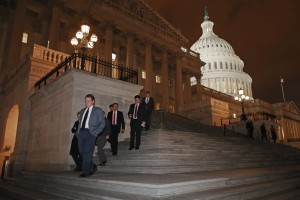It also leaves the tax code a mess, with multiple loopholes for businesses. The increased revenues are only about 20 percent of what’s needed to reduce the U.S. debt to sustainable levels, said Wessel.
And the deal only delayed the spending cuts for another two months, with no agreement about how they might be sorted out, Wessel said.
For California, that poses big problems, said Nickelsburg. “First of all, I think it’s important to realize there is still a fiscal cliff there,” he said. “The spending cuts were just pushed down the road. There is still a lot of uncertainty going forward. And people are going to postpone decisions.”
Postponing decisions can mean delaying investments the economy needs to move forward he said. “What we’re seeing is that California’s economic growth is slowing. We saw that in the last couple of months. We expect that this year. Heretofore, in the economic recovery we have been growing faster than the U.S. But we don’t expect that to continue in the coming months.”
The news wasn’t all bad. The deal extended unemployment benefits which should benefit 400,000 Californians, according to the Associated Press.
“In California we have an unemployment rate that is about 2 percentage points higher than the rest of the United States, so it’s relatively more important to Californians that those go through,” said Nicklesburg.
On the other hand, California has already raised taxes on high earners, and Nickelsburg warned that there may be limits to how much the rich can be soaked. “With Prop[osition] 30 we raised our income tax rates on the highest earners to the highest in the nation. You add those to the new [federal income tax] rates that were just passed with this deal and you have over 50% of income earned by high income earners in California paid out in taxes. Well, is that the tipping point where you have new job creation occurring elsewhere because the tax burden is too high? It remains to be seen.
“In the past increases in taxes on high-income earners have had a marginal effect but not a huge effect because of the benefits of living here in California and the very dynamic knowledge communities that we have here. But that advantage may be dissipating, particularly if the problems continue and the high tax rates continue relative to elsewhere for a very long period of time.”
Is there any hope? If tempers in Washington cool and Democrats find common grounds with Republicans -- after all everyone agrees the tax code needs fixing --then California could be headed for happier days in 2014, Nickelsburg said. "If that were to take place then I think the outlook for California is quite bright."
